What is a angiokeratoma?
An angiokeratoma is a small red to purple papule. May have a rough scaly surface. It consists of surface blood vessels (expanded capillaries) Often unnoticed, an angiokeratoma may crust over and bleed if accidentally scratched or damaged, or a harmless clot may form in the injury (thrombosis), changing the color to dark purple or black at night.
There are several types of angiokeratomas:
- Sporadic angiokeratoma
- Mibelli angiokeratoma
- Fordyce angiokeratoma
- Angiokeratoma circumscriptum
- Fabry disease (angiokeratoma corporis diffusum)
Sporadic angiokeratoma
- Solitary injuries
- Common in over 40 years.
Sporadic angiokeratoma
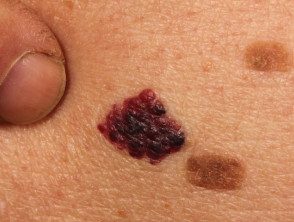
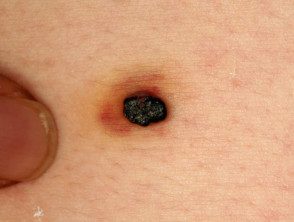
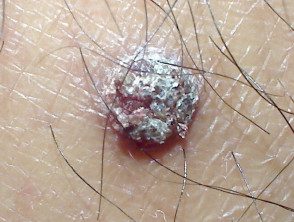
Mibelli angiokeratoma
- Multiple red to blue, dry to warty papules on fingers and toes, hands and feet, or less often knees, elbows, breasts
- Lesions appear in childhood or adolescence.
- Maybe family
- More common in women than men.
- Injuries can bleed with slight trauma
- Associated with chilblains
Mibelli angiokeratoma
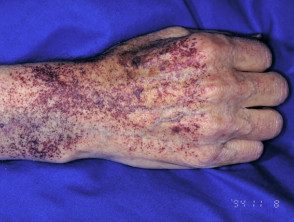
Mibelli angiokeratoma
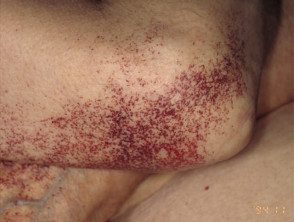
Mibelli angiokeratoma
Fordyce angiokeratoma
- It is most commonly found in the scrotum. It is also found on the shaft of the penis, the labia majora of the vulva, inner thigh and lower abdomen
- Plus predominant in those over 40
- Men are more affected than women.
- May present as a single injury or multiple injuries (> 100)
- Lesions are small, red, and less scaly in younger patients, whereas in older patients they tend to be larger, blue / black, and with overlying scales.
- Usually without symptoms and can only be noticed when they bleed after scratching or having sex
Fordyce angiokeratoma
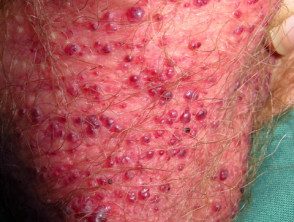
Fordyce angiokeratoma in scrotum
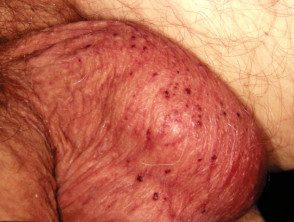
Fordyce angiokeratoma in scrotum
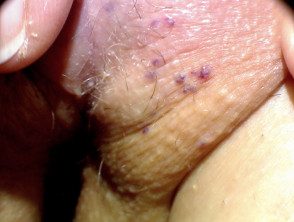
Fordyce angiokeratoma on the vulva
Angiokeratoma circumscriptum
- Rare birthmark (vascular malformation) May be present at birth but may occur later in childhood or adulthood
- Women are more affected than men 3: 1
- A group of injuries to a small area of the leg or trunk
- Over time, the lesions can darken and change in shape and size.
Angiokeratoma circumscriptum
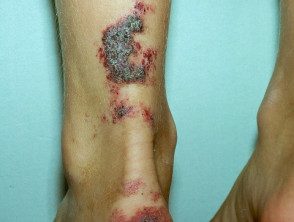
Angiokeratoma circumscriptum

Angiokeratoma
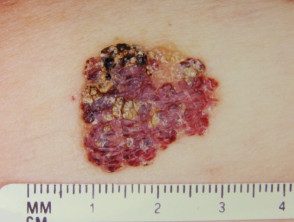
Fabry disease (angiokeratoma corporis diffusum)
Fabry disease is a rare, serious inherited disorder caused by a deficiency of an alpha-galactosidase. enzyme, ceramide trihexosidase
- Excessive amounts of glycosphingolipids are deposited in blood vessels and internal organs.
- More serious in men than in women.
- Angiokeratomas are extended, more numerous in the lower trunk and groin
- You can present with fever and painful hands and feet
- May cause corneal opacities, kidney failure, heart failure, strokes, arthritis, colitis and many other problems
Angiokeratoma corporis diffusum
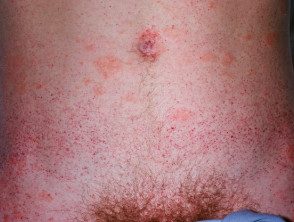
Angiokeratomas in Fabry disease
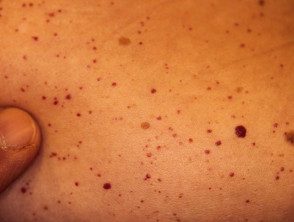
Angiokeratomas in suspected Fabry disease
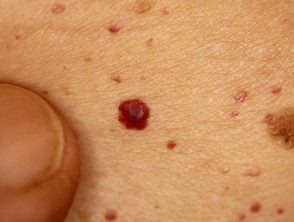
Angiokeratomas in suspected Fabry disease
See more images of angiokeratomas.
What Causes Angiokeratomas and Who Gets Them?
Apart from Fabry disease, which is caused by a genetic defect, the cause of other angiokeratomas is unknown.
See also angiokeratoma. pathology.
What is the treatment for angiokeratomas?
Angiokeratomas are harmless superficial vascular lesions that can usually be left alone. How black spots sometimes look alike melanomaA skin biopsy can be done to discard malignancy and dispel any fear.
If bleeding becomes a concern or treatment is requested for cosmetic purposes, it can be removed. Surgical options include excision, To be therapy, cryotherapy or electrocautery.

